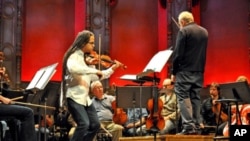Haitian American violinist Daniel Bernard Roumain is in Vancouver this month as part of the cultural celebrations surrounding the Winter Olympics. Roumain - also known as DBR - blends classical violin, funk, rhythm and blues, and hip hop into a musical stew for everyone to enjoy.
Daniel started playing violin when he was five years old. In his hometown of Margate, Florida, he heard a classmate playing the instrument and fell in love with the sound. Growing up in south Florida, he was exposed to a variety of musical styles - reggae, Afro-Cuban and Brazilian music, Latin, as well as classical.
He eventually studied music at Vanderbilt University and got a PhD in composition from the University of Michigan. But the musical influences of his childhood never left him.
Roumain told VOA that his mixture of styles is like a Creole dish - made up of many parts - and that it reflects both his heritage and the modern technology that allows people to make their own playlists.
"My Haitian ancestry and my south Florida upbringing collided into a mixing of different musical genres," he says. "And it makes my job and what I am wanting to do with classical music - mixing genres - much easier and I think relevant."
Roumain draws from several traditions and techniques in his music. He uses percussive hits of the bow against the strings, he plucks the strings with his fingers and thumb, sometimes with the bow in his mouth and he plays the violin like a jazz bassist plays the upright. The musician says it is all part of his conversation with the audience.
"I stomp my feet, I use my whole body, I vocalize, often times I talk and play at the same time," says Roumain. "I should say I 'testify' and play at the same time. But to me, playing the violin is talking anyway. You are revealing a certain aspect of yourself. I am adding words to those sonic sounds. I think the way I play the violin has as much to do with Jimi Hendrix, as it does Prince, as it does with Paganini."
But DBR is not just a musician. Being Haitian-American, he has been thrust into a spotlight that he did not seek because of the January earthquake that devastated Haiti. Although he has identified himself as a Haitian-American composer since 1992, the disaster has made him even more aware of his roots.
Roumain is donating a portion of his merchandise sales to Haitian relief. He plans to visit Haiti and he and singer Emeline Michel are planning a series of concerts and other events to help rebuild their ancestral homeland.
The violinist says the earthquake has changed his music, even to the point of putting his version of the Haitian national anthem in his concerto.
"It's a militant kind of stance. Whether it's [my pieces] Voodoo Violin concerto, or Haitian Essay, or whatever my work might suggest now, these are all opportunities and I can, I think, bend them towards a common good, towards helping Haiti, towards understanding that nation. It really is enough, I think, for people to come to a concert and sit and listen."
Roumain's audiences hear a variety of sounds in his concerts. His innovative approach to classical music has earned him respect and admiration from fans of all tastes, including his fellow musicians.
Vancouver Symphony Orchestra conductor Bramwell Tovey - a Grammy and Juno [Canadian Grammy] Award winner - says Roumain offers a fresh take on classical music that inspires not only audiences, but also other musicians.
"I think what Daniel is doing with this particular piece just so shortly after the terrible, terrible disaster that has occurred in Haiti, I think what we are doing is we are communicating with people about this experience through music," says Tovey. He adds, "And that's another level on which we can talk to each other."
Daniel Bernard Roumain says he has conflicting emotions since the January 12 earthquake. Sometimes he feels guilty, other times he feels helpless or like he is not doing enough. But he says all those emotions help to inform and inspire his conversation with the audience. He also feels a special responsibility as a Haitian American to keep his ancestral home in the forefront - even after it fades from the headlines.




